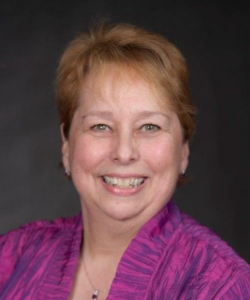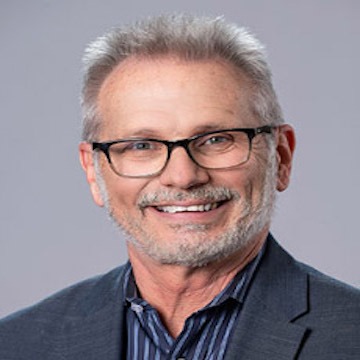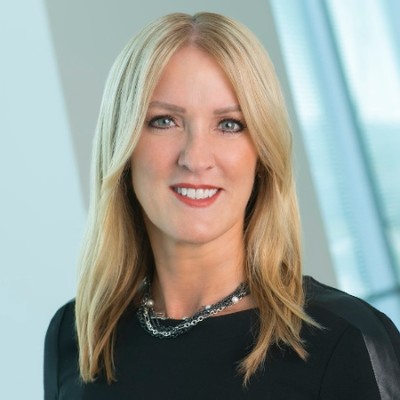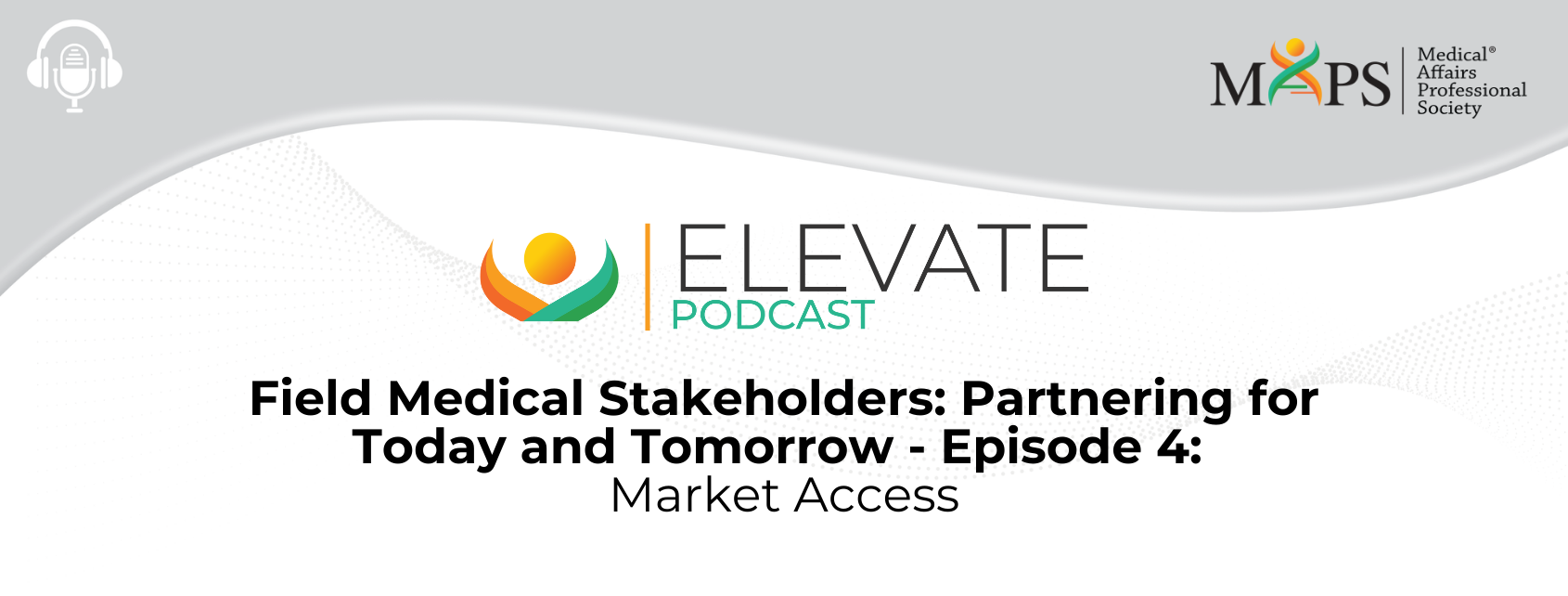Objectives:
At the end of this series of podcasts, the participant should be able to:
· Discuss the functions and activities of key internal partners
· Identify potential areas for compliant collaboration by MSLs with key internal partners

MODERATOR: Kathryn Gann

INTERVIEWER: Ralph Rewers

GUEST: Shontelle Dodson, PharmD
Following is an automated transcription provided by otter.ai. Please excuse inaccuracies.
Kathryn Gann
Welcome to the Medical Affairs Professional Society, MSL Field Medical focus area working groups podcast series, entitled Field Medical stakeholders Partnering for today and tomorrow. In this fourth podcast, we’ll be discussing market access. I’m Katherine Gann. I’m a member of the MAPS MSL Field Medical Focus Area Working Group, and I’ll be the moderator for this podcast. Currently, I’m an independent consultant in Medical Affairs. Having spent my 30 year career as an MSL, an MSL manager and an MSL trainer. Our legal disclaimer is as follows. The views expressed in this recording are those of the individuals and do not necessarily reflect on the opinions of MAPS, or the companies with which they are affiliated. This presentation is for informational purposes only, and is not intended as legal or regulatory advice. We encourage you to engage in conversations about partnering with Field Medical stakeholders with other MAPS members by the community portal on the MAPS website. Simply log in with the email address and password associated with your MAPS account and click on the discussions tab. Then scroll down to Field Medical to post a question or review previous postings. The objectives for this series of podcasts are that at the end of the series, the participant will be able to one discuss the functions and activities of key internal stakeholders and to identify potential areas for compliant collaboration by MSL with key internal stakeholders. I’d like to thank today’s panelists for sharing this subject matter expertise with the MAPS membership. speaking today are Ralph rulers. Senior Director of Global Field Medical excellence at Abbvie. Ralph will be our interviewer, and Shontelle Dodson, Senior Vice President health systems at Astellas Pharma us, and Shontelle is our interviewee. Ralph, before I turn this over to you, would you please just briefly describe your background and your current position? And then I’ll let you interview Shontelle?
Ralph Rewers
Well, thank you, Kathy. I really appreciate it. And thanks for the opportunity. I currently am the Senior Director for Global Field Medical Excellence at Abbvie. And I’ve been in in the Field Medical area for approximately 27 years. I’m also the CO lead for the focus area working group for for the MAPS process. And so I’m happy to do that. Within the 27 years I’ve been in industry I’ve been just in the Field Medical realm. I’ve been an MSL, I’ve been a field director, and also taken on national responsibilities both in the US as well as globally. So I’m happy today to talk with Shontelle Dodson. And Shontelle, how about a little background in your background in industry?
Shontelle Dodson
Thank you so much, Ralph, and thank you to the MAPS organization for inviting me to participate in the podcast today. As it was mentioned, I’m currently working at Astellas. I’m the Senior Vice President of Health Systems for our US Commercial Division. And this organization is largely market access focus. So we have groups that support our regional as well as national payers. We have a contract and pricing group, which manages all the contracts for the various organizations, but it’s also responsible for gross to net for our entire product portfolio. We have a marketing group within that this provides all our resources for market access. And in addition, we also have a strategic accounts organization that includes key account managers, specialty oncology account managers, and a team that supports reimbursement and patient support. So they run our patient support programs and our hub.
Ralph Rewers
Well, thanks, Shontelle. So it sounds like a fascinating role that you have. Can you explain to us a little bit more about this role? For instance, what functions report into your organization? Does your group have any global responsibilities and what do you consider your primary internal stakeholders?
Shontelle Dodson
Sure, so I will start with the stakeholders. And I would say that, you know, we work because we work in market access and patient support. We work with stakeholders across the entire organization. So it’s not limited just to a small group, but our primary stakeholders would be the therapeutic area brand team, the Medical Affairs organization, both from a home office perspective, as well as our MSL organization, ethics and compliance and legal. And with all of the groups that I mentioned, they actually all report directly into me we all have responsibilities just for the US Commercial organization.
Ralph Rewers
Thanks. Thanks very much for that Shontelle, is there a similar group a global group of within your company that similar responsibilities?
Shontelle Dodson
We do have a global market access function and we work very closely with that organization as well. Really to ensure alignment around our product value proposition to ensure that we’re having discussion to understand where we need additional information and also to ensure that we have an align message around that information as well as an align commercialization strategy.
Ralph Rewers
Thank you. You know what our listeners often are very interested in is that their MSL today and they’re looking for other opportunities. I know you’ve been an MSL and you’ve led MSL groups earlier in your career, how do you see the MSL subField Medical enhancing their collaboration with groups like yours?
Shontelle Dodson
I have been an MSL and MSL organization filled medical organizations are very near and dear to me, because they’re such a critical part of any company. I think there’s several key things that are important when you’re working across functions, especially when you’re working MSL with the market access function. And the first of those is to have a solid understanding of what’s going on in the business. And what I mean by that is there changes happening all the time in the healthcare landscape. Their policy changes their market trends in whether companies are coming together consolidation, or the recent executive orders that have been in the news for the past several months. I think it’s really important. You don’t have to be an expert in that area, but to be able to speak to and understand some of those key issues. So for example, reference pricing most favored nation, when you hear someone talk about the rebate rule or copay, accumulators have just having a sound knowledge of what’s going on in that space. The next thing I think is so important is really strong communication skills. In my experience and being an MSL and and leading MSL groups and organizations, those people who have the strongest communication skills tend to really excel in that position. And then finally, really strong technical expertise. I think that’s a given. And that’s what we go to our MSL organization for is we’re looking for the product expert, an expert in all of the data on our product, both from a clinical safety and efficacy perspective, but also when it comes to our value proposition and our outcomes data health resource utilization data, as well as being an expert in the disease area and understanding what’s going on in that disease area and any new disease information.
Ralph Rewers
Thanks, Shontelle. So it’s really terrific because as we as we look, when we hire MSL, as we always say, we’re looking for three key pillars. We’re looking for that strong technical expertise, they have to communicate very well. And they really have to understand the business and I think your career kind of shows that and truly what we look at from a Field Medical perspective. Another question I have for you is do you have any best practices that about sharing and partnering with MSL is anything specific you’d like to talk about?
Shontelle Dodson
Sure, we work very closely with our field organization, our Field Medical organization within Astellas, we have two groups, we have field hlr, as well as our therapeutic area in sales. And we work closely with him, for example, in reactive responses to customers around product information, sometimes this is come to fruition in the form of a formulary presentation. Other times, it’s simply to get additional information on our product. We our first line of collaboration is with our field he or group when things are focused really on outcomes related topics or healthcare resource utilization. But we’re fortunate in that we can bring in our therapeutic MSL to really support that deeper dialogue and deep deeper technical expertise. So the three really work together market access field he or as well as the therapeutic area in a sale. And I think from a best practice perspective, there’s a couple of things that I’ve seen that have really been so important. As I mentioned earlier, I’m a huge fan of the MSL organization because they’re on the front lines with customers, and they receive so much important information and intelligence that they can share with the broader organization that helps us to understand where we have evidence gaps, what questions payers may be asking us where we may need to generate additional data, and then being able to work together to start developing a strategy to address that. I think that’s really important. And the other thing I would say is that the places where I see it most successful most collaboration is where there’s a proactive approach to ensuring that there’s regular dialogue between the market access function and the Field Medical functions, whether that’s around a business update, talking about what the payer needs are understanding a healthcare landscape, whatever that topic is, but it’s a regular recurring case. have communication interaction and not just reactive, that really, in my opinion puts that that relationship and that collaboration in a very positive trajectory.
Ralph Rewers
Yeah, terrific, Shontelle, I mean, is that the key element, there is what you mentioned, which is that constant communication, you don’t want to get into a reactive mode, you want to have that constant dialogue. So thank you. Thank you for sharing that. You know, you and I have the opportunity to work I hate to say it over over 20 years ago. And while my career has stayed within the Field Medical realm, you’ve had a very, very varied career. So if you would share with our listeners, can you give us your career path and tell us how that led to your current position?
Shontelle Dodson
I’d be happy to. So after I completed my training as a pharmacy and completed my residency, I actually stayed in the hospital setting and the VA hospital as a clinical pharmacist. And it was a job that I really loved because it was direct patient care and, and I really loved that interaction with patients. However, I did leave that position and move into the industry where I’ve really spent the rest of my entire career. And that first position was as an MSL, and I was very fortunate to come along where there were a lot of advances happening within the cardiovascular space. And as Ralph mentioned, that’s when he and I first met is that early in my career. As an MSL, I moved into MSL leadership, ultimately into functional leadership in the MSL organization, and then I had the opportunity to, to work in house and to actually lead and support a brand within our urology portfolio. And I just learned so much during that time, whether it was from writing protocols to understanding the regulatory requirements for what we have to submit on our products, to developing Core Data Sheets, developing larger budgets for your clinical study budget, it was just such a great opportunity for me that I’m so thankful for. And from there, I made a decision to go into biotech, and I left Big Pharma. And I spent about five years in biotech. At that time, I worked on taking a product from phase two, into phase three, development for regulatory approval. This was a new molecular entity. And in the oncology space, and again, just learned so much, not only from the business perspective and working in biotech, but also in the development of pivotal trials ultimately, for regulatory approval. Unfortunately, we had one failed phase three, one, positive phase three, and the product did not get approved, and ultimately, the company was dissolved. So at that point, I made a decision to move back into a midsize pharma. And that’s when I joined Astellas, I had learned so much around the value proposition of products at that point that I came back into a sell us leading the health outcomes organization for the US business at that time. A couple years of doing that, I moved over to the global Medical Affairs organization where I lead global medical excellence. And that included global publication, global medical information, global hlr, as well as global standards and processes. So learned a lot about the global business and how things are done differently in various places across the world. From there, I actually came back into the Americas organization as the head of Medical Affairs for both North and South America, again, in a job that I really loved, and had just a fabulous time leading that part of the organization. And then just over two and a half years ago, I was asked to move to the commercial organization to head up one of the commercial business units. And that’s that’s where I am now leading the health systems business unit. So I’ve had a lot of varied experiences. across my career, as Ralph mentioned, I’ve just been incredibly blessed to to be part of those and just learn so much and, and take, you know, challenges and opportunities to really grow in my career.
Ralph Rewers
Shontelle Thanks for sharing everything with us today. We really appreciate it. I think our listeners are going to just get a wonderful opportunity to hear about all about your organization and how you’ve gotten there. So thank you very much. With that. I’m going to turn it over back to our moderator, Kathy, who’s going to wrap up so Kathy,
Kathryn Gann
Thank you, Ralph. And thank you Shontelle for both participating today. This has been really insightful and I think what our listeners will also carry away as they listen to this series of podcasts is the importance of MSL insights. It’s a recurring theme that we hear in each of these podcasts. So in line with our learning objectives, now participants should have a better understanding of the role and function of market access and how MSL may compliantly interact with this group. And certainly an added bonus has been hearing how Shontelle was able to use her MSL skills to build her career. This has been the fourth podcast In this series on the topic of Field Medical stakeholders, partnering for today and tomorrow, if you are max member, thank you for your support of MAPS. If you’re not yet a MAPS member and would like access to additional resources in this area, please visit the MAPS website to explore joining that is Medical Affairs.org forward slash membership. This concludes the podcast



